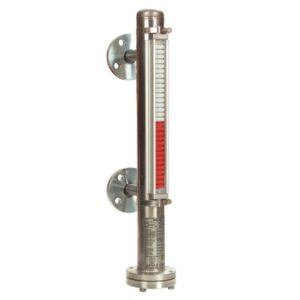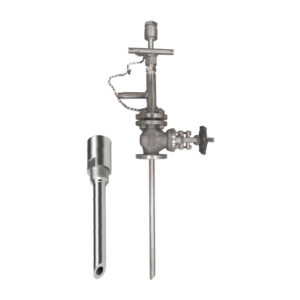Reflex Level Gauges: The Ultimate Buyer’s Guide for Industrial Applications

Choosing the right level gauge is one of the most important decisions in any industrial plant.
Whether it is oil and gas, chemical processing, power generation or water treatment, accurate level measurement keeps operations safe, efficient and compliant.
Among the various options available, the reflex level gauge continues to be one of the most reliable and cost effective solutions for liquid level monitoring.
If you are a plant engineer, procurement professional or instrumentation buyer, this guide will help you understand everything you need to know before selecting a reflex level gauge.
What Is a Reflex Level Gauge
A reflex level gauge is a mechanical device used to visually monitor the level of liquids inside a tank, column or boiler.
The gauge works on the principle of light refraction. The specially designed prismatic glass makes the liquid area appear dark and the vapor space appear bright.
This simple contrast allows operators to read the level clearly even in challenging industrial environments.
For a basic understanding of the principle, you can refer to the overview on Globe United FZE’s product page.
Why Reflex Level Gauges Are Preferred in Industrial Plants
Across industries, the reflex level gauge is popular because of its simplicity, accuracy and low maintenance needs.
Some key advantages include:
• Clear visibility even in high pressure or high temperature conditions
• Long service life with proper glass and gasket selection
• Cost effective compared to magnetic level gauges
• Suitable for liquids with low to medium viscosity
• Minimal maintenance compared to other technologies
For plants that prefer dependable equipment without electronic complexities, the reflex level gauge remains a trusted choice.
Common Problems Buyers Face When Choosing a Level Gauge
Instrumentation buyers often share the same concerns:
• Not sure which material grade is suitable for highly corrosive media
• Difficulty deciding between reflex, transparent and magnetic level gauges
• Visibility issues when the medium is cloudy or foaming
• Confusion about certifications required for hazardous areas
• Unplanned maintenance because the glass was not selected correctly
• Over specification that increases cost without improving safety
This buyer’s guide addresses these challenges so you can make an informed decision without second guessing.
Key Specifications to Check Before Buying a Reflex Level Gauge
Selecting a reflex level gauge is not only about price. It involves matching the gauge with your process conditions.
Here are the parameters you must review:
1. Pressure and Temperature Rating
Always confirm the maximum operating pressure and temperature of your system.
Power plants and steam lines require higher pressure ratings and often need mica shields to protect the glass from steam erosion.
2. Material of Construction
Different industries require different material grades:
• SS304 or SS316 for general industrial applications
• Duplex or super duplex for offshore and corrosive environments
• Hastelloy or Monel for aggressive chemical applications
For buyers working in the GCC, especially in oil and gas applications, it is important to follow regional material selection standards.
The ADNOC Materials Selection Guidelines provide a clear, practical reference for choosing the correct alloys, corrosion resistant materials and protective measures for high pressure and high temperature environments.
3. Type of Process Fluid
The clarity, color, viscosity and corrosiveness of the liquid influence the glass selection and accessories required.
4. Glass Type and Protection
Borosilicate glass is standard. Mica shields are essential for steam service to avoid clouding or burnout.
5. Center to Center Length
Confirm the mounting height on your tank or column. Custom lengths are usually available from Globe United.
6. Connection Type
Flanged or threaded connections depend on your existing line design.
Reflex vs Transparent vs Magnetic Level Gauges
Many buyers struggle to decide which type to select. Here is a simple comparison:
Reflex Level Gauge
Best for: Boilers, storage tanks, distillation columns, water treatment units
Advantages: Cost effective, simple, durable
Transparent Level Gauge
Best for: Interface levels or boiling liquids
Advantages: Dual glass allows visibility of both liquid and vapor
Magnetic Level Gauge
Best for: Hazardous zones, corrosive fluids, remote visibility
Advantages: No direct contact with fluid, suitable for dangerous media
A detailed comparison is available here on the Globe United website.
Industry Wise Recommendations
Oil and Gas
Choose corrosion resistant materials and ensure your gauge complies with ATEX or equivalent certifications.
Chemical Plants
Ensure the gasket and body materials are compatible with acids, solvents or alkaline media.
Power Plants
High pressure steam requires mica shielding and high temperature gaskets.
Water Treatment
A standard stainless steel reflex level gauge is usually sufficient.
Cost Factors to Consider
When comparing suppliers, do not evaluate only the initial price. Consider:
• Expected life of the glass
• Quality of the gaskets
• Need for spare parts
• Replacement downtime
• Availability of local support
A slightly higher quality gauge often reduces long term operational cost.
How Globe United FZE Supports Buyers
As one of the trusted reflex level gauge suppliers in Dubai, Globe United FZE provides:
• High quality gauges built to international standards
• Custom lengths and materials
• Fast delivery for urgent replacement jobs
• Technical support for selection and installation
Explore Globe United’s full range of level gauges here.
Installation Tips to Avoid Future Problems
• Ensure proper torque while tightening the glass
• Check alignment before final mounting
• Use compatible gasket materials
• Keep spare glass and gaskets ready for high pressure applications
• Inspect periodically for corrosion or glass clouding
A little care during installation avoids most future leaks and failures.
A reflex level gauge is a small component in a large plant, yet it plays a critical role in safety and operational efficiency.
Choosing the right gauge saves time, reduces maintenance and prevents costly shutdowns. By understanding your process conditions and selecting a trusted supplier like Globe United, you can ensure long term reliability and peace of mind.






